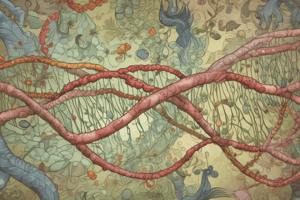Podcast
Questions and Answers
Who is likely to benefit from referral for genetic testing or counseling?
Who is likely to benefit from referral for genetic testing or counseling?
- A couple with no children
- A couple with no family history of genetic disorders
- An individual under 30 years of age
- An individual with an inborn error of metabolism (correct)
What is a key nursing responsibility in genetic counseling?
What is a key nursing responsibility in genetic counseling?
- Assisting in financial planning related to genetic testing
- Providing medical treatment for genetic disorders
- Supporting couples during the wait for test results (correct)
- Offering psychological therapy post-testing
Which couple is most likely to benefit from genetic counseling according to the text?
Which couple is most likely to benefit from genetic counseling according to the text?
- A couple with a child with a congenital disorder (correct)
- A couple of young age
- A couple who are closely related
- A couple with no children
What is an important aspect of genetic disorders assessment according to the text?
What is an important aspect of genetic disorders assessment according to the text?
Which individual is most likely to benefit from genetic testing according to the text?
Which individual is most likely to benefit from genetic testing according to the text?
What is a significant factor mentioned in determining who might benefit from genetic counseling?
What is a significant factor mentioned in determining who might benefit from genetic counseling?
Why are consanguineous couples mentioned in the context of genetic counseling?
Why are consanguineous couples mentioned in the context of genetic counseling?
What type of couples are highlighted as requiring genetic testing or counseling?
What type of couples are highlighted as requiring genetic testing or counseling?
What do nursing responsibilities include in relation to genetic disorders assessment?
What do nursing responsibilities include in relation to genetic disorders assessment?
What is a critical aspect of the genetic counselor's role according to the text?
What is a critical aspect of the genetic counselor's role according to the text?
Flashcards are hidden until you start studying
Study Notes
Genetic Assessment and Counselling
- Patients at risk of inherited disorders should have access to genetic counseling for advice, resources, and support.
- Genes are the basic units of hereditary that determine physical and cognitive characteristics, composed of DNA (Deoxyribonucleic acid).
Nature of Inheritance
- In humans, each cell contains 46 chromosomes (22 pairs of autosomes and 1 pair of sex chromosomes).
- Spermatozoa and ova each carry only half of the 23 chromosomes.
- A person's genotype is their actual gene composition, while their phenotype is their outward appearance or the expression of their genes.
- A person's genome is the complete set of genes present, approximately 50,000-100,000.
Genetic Disorders
- Genetic disorders occur when there is a defect in the structure or number of genes or chromosomes.
- Inherited disorders can be passed from one generation to the next.
- Genetic disorders can occur when an ovum and sperm fuse during meiotic division.
- Some genetic abnormalities are severe and cannot continue past a certain point.
- In-vitro fertilization (IVF) can be used to examine for genetic disorders before implantation.
Mendelian Inheritance
- Homozygous refers to a person having two healthy genes (one from each parent).
- Heterozygous refers to a person having different genes (a healthy gene from one parent and an unhealthy gene from the other).
- Examples of genetic disorders include:
- Color blindness
- Fragile X syndrome
- Duchene muscular dystrophy
- Multifactorial (Polygenic) Inheritance
Chromosomal Abnormalities
- Chromosomal abnormalities occur when the division of chromosomes is uneven (nondisjunction).
- Examples of chromosomal abnormalities include:
- Nondisjunction abnormalities
- Deletion abnormalities
- Translocation abnormalities
- Mosaicism (e.g., Down syndrome)
- Isochromosomes
Genetic Counselling
- The purpose of genetic counseling is to:
- Provide accurate information about inherited disorders
- Reassure individuals that their child may not inherit a particular disorder
- Allow individuals to make informed choices about future reproduction
- Educate about inherited disorders and the process of inheritance
- Offer support by skilled health care professionals
Couples Who May Benefit from Genetic Counselling
- Couples who have a child with a congenital disorder
- Couples whose close relatives have a child with a genetic disorder
- Individuals who are known balanced translocation carriers
- Individuals who have an inborn error of metabolism or chromosomal disorder
- Consanguineous (closely related) couples
- Couples of ethnic backgrounds in which specific illnesses are known to occur
- Women older than 35 years and men older than 55 years
Nursing Responsibilities
- Explain procedures and genetic screening tests to couples
- Support couples during the wait for test results
- Assist couples in values clarification, planning, and decision making based on test results
Genetic Disorders Assessment
- Obtain information and document diseases in family members for a minimum of three generations
- Document the mother's age (disorders increase in incidence with age)
- Document whether the parents are consanguineous or related to each other
Studying That Suits You
Use AI to generate personalized quizzes and flashcards to suit your learning preferences.




